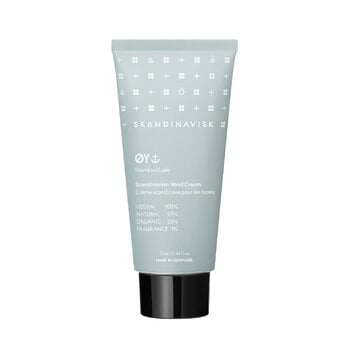Skandinavisk’s Øy hand cream has a pleasant scent that evokes memories of still lakes, deserted islands and tranquil forests – Øy is Norwegian for "island". The fresh fragrance was inspired by boat trips to secluded islands filled with damp rockmoss and the lush scents of dog rose and crabapples. The richly moisturising hand cream is made in Denmark with natural ingredients including local spring water, and it comes in a delightfully decorated, recyclable aluminium tube.
Ingredients: Aqua*, Aloe Barbadensis Leaf Juice**, Cetyl Alcohol*, Coco-Caprylate/Caprate*, Glyceryl Stearate*, Glycerin**, Glyceryl Stearate Citrate*, Butyrospermum Parkii Butter**, C15-19 Alkane*, Cetearyl Olivate*, Sorbitan Olivate*, Parfum, Glyceryl Caprylate*, Prunus Amygdalus Dulcis Oil**, Tocopherol, Xanthan Gum*, Alpha-Isomethyl Ionone, Citral, Eugenol, Geraniol, Hexyl Cinnamal, Limonene, Linalool, Sodium Gluconate*, Citric Acid*, Sodium Benzoate, Potassium Sorbate.
*Ingredient of natural origin / **Organic ingredient










